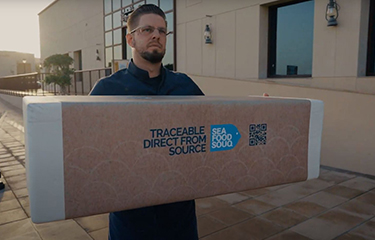Online seafood market Seafood Souq is stepping up support for its partners in Senegal, Oman, and Bangladesh.
The company aims to develop and implement seafood traceability systems to address illegal fishing and align supply chains to the fast-changing dynamics of the global seafood market.
Seafood Souq CEO Sean Dennis told SeafoodSource that Seafood Souq, through its traceability signature tool “SFS Trace,” is working with its partners, which include fishers, processors, and cold-chain service providers, in these countries “to facilitate international seafood trade and promote better fishing and harvesting practices that have minimal environmental impact.”
SFS Trace is a tool accredited by the Global Dialogue on Seafood Traceability (GDST) that facilitates efficient traceability throughout the seafood supply chain while adhering to regulatory and consumer requirements. The tool uses an automated algorithm that tracks data, such as date of catch, location, producer information and background, and more, in an effort to map a piece of seafood’s journey from ocean to table.
“In Senegal, Oman, and Bangladesh, Seafood Souq acts as network orchestrator in building a streamlined supply chain, and SFS Trace provides full supply chain traceability to the eventual seafood purchaser in markets such as Europe and the U.S.,” Dennis said.
SFS Trace also operates both as a trade tool and technology product that is licensable as a software-as-a-service (SAAS) product to seafood supply chain players globally.
Dennis said Seafood Souq’s partnerships in the three countries involves “working with local fishers in areas such as investment, training, and best practices and then building an effective cold chain at landing to address wastage issues and to ensure the quality of the catch is maintained and fishers are able to get the best price.”
In Oman, Seafood Souq has piloted a project with the International Pole and Line Foundation that involves giving Omani fishers engaged in the country’s one-by-one handline operations the skills needed to produce higher-quality, grade-A sashimi tuna. Seafood Souq, which recently expanded its operations in the Middle East, will then market the products on its digital platform.
Dennis said recent initiatives in the European Union and the U.S. aiming to cut down on illegal seafood imports and improve food safety have ...
Photo courtesy of Seafood Souq








